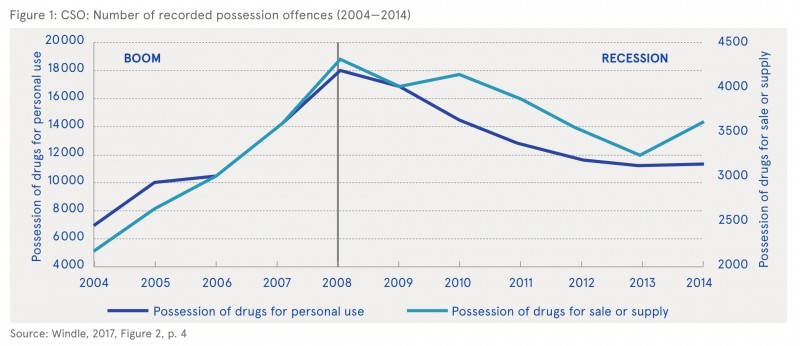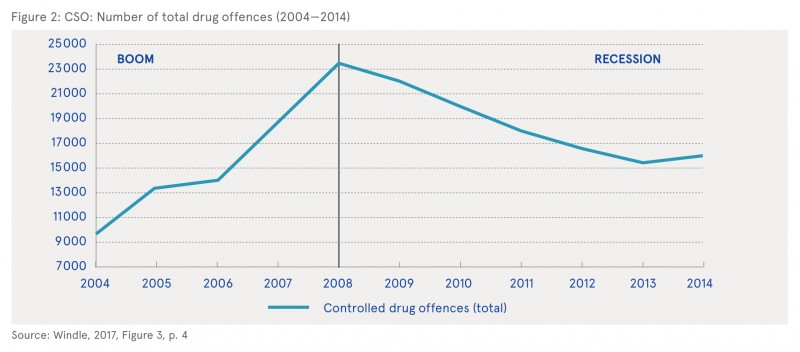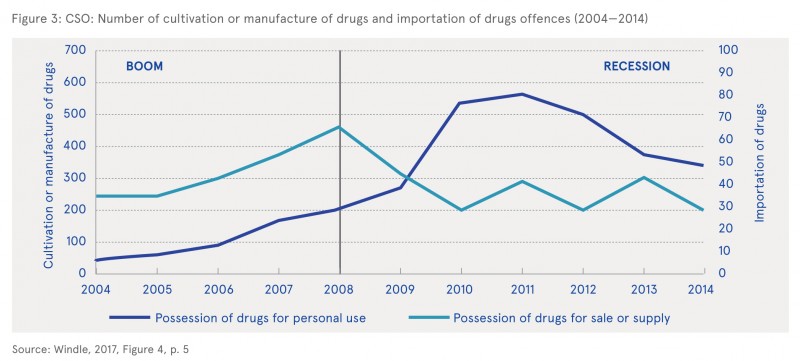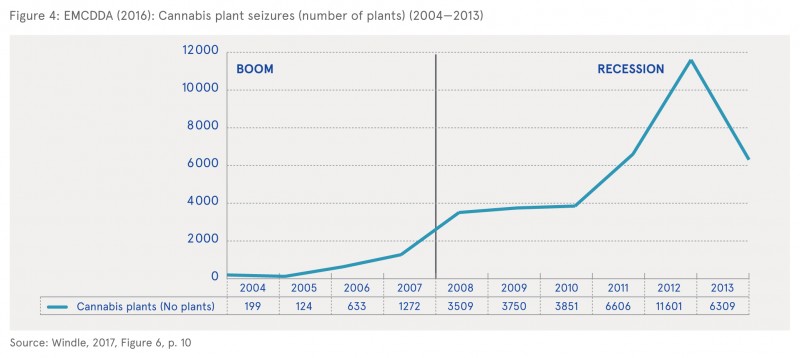Guiney, Ciara (2018) Impact of the great recession on the Irish drug market. Drugnet Ireland, Issue 65, Spring 2018, pp. 19-21.
| Preview | Title | Contact |
|---|---|---|
|
PDF (Drugnet Ireland, Issue 65 Spring 2018)
- Published Version
2MB |
The dearth of literature examining the relationship between economic recessions and drug markets has indicated that economic recessions mainly result in higher drug consumption and drug dealing. A recent study carried out by James Windle at University College Cork examined this relationship from an Irish perspective.1 Although the trends presented here have already been presented in the Irish national report on drug markets and crime (2016),2 Windle extended the findings by putting forward explanations as to why these trends have occurred.
Methodology
Controlled drug offence data (2004‒2015), recorded by An Garda Síochána (AGS) on their police using leading systems effectively (PULSE) system and published in annual reports by the Central Statistics Office (CSO), were analysed. This data acted as a proxy for consumption and drug dealing.
Results
As illustrated by the CSO data, possession of drugs for personal use and sale or supply reached a peak in 2008 and mainly declined thereafter (Figure 1). A similar trend was shown in Figure 2, where controlled drug offences peaked in 2008 and declined thereafter.


Figure 3 shows that trends for importation drug offences were similar to trends shown in Figures 1 and 2. However, trends for cultivation or manufacture initially showed a steady increase before the recession (2004‒2008). But, during the recession it thrived; a ‘dramatic increase’ was shown between 2009 and 2011. Although a decline was evident thereafter, the number of incidents remained higher than levels shown before 2009.

In an attempt to explain the Irish drug market trends, Windle put forward two hypotheses.
Hypothesis 1: emigration
Windle argued that the trends evident in Ireland contrast with the international literature, which has suggested that during a recession drug consumption and drug dealing should increase. As this was not the case in Ireland, he proposed that emigration might be a more apt explanation for the Irish findings. Drawing on Irish data from the CSO, he stated that between 2006 and 2013, emigration increased from 36,000 to 89,000; a large number of these individuals were unemployed young people. This cohort is known to have higher levels of drug consumption.
Hypothesis 2: adaptation
The second hypothesis put forward focused on cannabis and postulated that Irish dealers and consumers adapted to having a reduced income by growing their own product, which contributed to a decline in the importation of drugs. Evidence to support this argument can be seen in Figure 4, where a major increase in cannabis plant seizures was evident between 2010 and 2012. Windle argued that the steady increase in cultivation illustrated before and during the recession could be construed as evidence that the recession resulted in adaption. However, he also noted that there is a number of other explanations for increased cannabis cultivation, which are not related to the recession. These include, for example, import substitution (i.e. growing the product closer to the consumer), being more cost effective, allowing control over quality and taste, and having no contract with criminals.

Limitations and future research
Throughout this paper, the author and others have acknowledged the extensive limitations of the data recorded by AGS.3,4 That being said, it is recognised in academic research that there are advantages to using official data as it not only allows for trends over time to be examined but also acts as a primary source of information related to criminal activity in Ireland. The author made a number of suggestions for further research. For example, triangulating existing data with other types of quantitative and/or qualitative data; accounting for Irish citizens who emigrated during the recession and comparing them with those that stayed; and whether austerity measures, such as reduced Garda visibility, resulted in a reduction in recorded controlled drug offences. Finally, as the outcomes of the recession may not be fully known for 10 to 20 years, Windle identified the need for longitudinal research to follow children born in the recession until adulthood.
Conclusion
Windle concluded that changes in the drug market witnessed in Ireland may be due to young people leaving Ireland to seek work, which resulted in a reduction of potential consumers. Those that remained availed of advances in technology and communications to produce their own cannabis, which would have impacted further on the quantity of cannabis being imported into Ireland. The change evident in Ireland was consistent with those seen in other industrialised nations; however, the outcome was probably exacerbated by the recession. Windle argued that these changes illustrate Ireland’s global interconnectedness and emphasised the importance of recognising and understanding the influence of global and regional drug market trends on the local environment.
- Windle J (2017) The impact of the great recession on the Irish drug market. Criminology and Criminal Justice, Nov 10: 1‒20. https://www.drugsandalcohol.ie/28797/
- Health Research Board. Irish National Focal Point to the European Monitoring Centre for Drugs and Drug Addiction (2017) Focal Point Ireland: national report for 2016 ‒ drug markets and crime. Dublin: Health Research Board. http://www.drugsandalcohol.ie/25286/
- Central Statistics Office (2016) Review of the quality of crime statistics 2016. Cork: Central Statistics Office. http://www.drugsandalcohol.ie/26176/
- Central Statistics Office (2015) Review of the quality of crime statistics. Dublin: Government of Ireland. http://www.drugsandalcohol.ie/24887/
MM-MO Crime and law > Crime > Substance related crime > Crime associated with substance production and distribution
MM-MO Crime and law > Substance related offence > Drug offence > Illegal distribution of drugs (drug market / dealing)
VA Geographic area > Europe > Ireland
Repository Staff Only: item control page